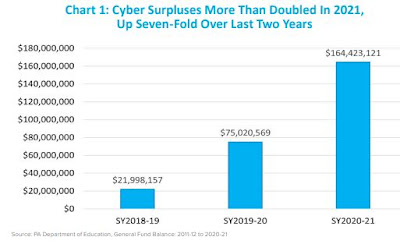The fourteen cybers were, at the end of last school year, sitting on $164 million in unassigned fund balances, aka extra money sitting in the bank. Those 2020-21 fund balances were double what they had in 2019-20, and seven times the amounts from 2018-19.
That growth represented ten times the growth of public schools. So, no--it wasn't raining money on everyone.
Nor can it be explained by the influx of students into cybers during the pandemic. The money spiked at ten times the rate by which enrollment increased.
If you'd like to see that in chart form, here are the charts produced for that report.
Pennsylvania actually has laws about how much unassigned fund balance a school district can carry, on the not-unreasonable assumption that district fund balances are composed mostly of taxpayer dollars, and if taxpayer dollars are going to be just sitting there, they ought to be just sitting there in taxpayer bank accounts, not district ones. Public schools can carry up to 8% of their budget as surplus.
However, there are no such caps for cyber charters. If cybers were held to the same standard as public schools , eleven of the fourteen would have been over the 8% line. The remaining three were over 50% of their expenditures.
The system is not perfect, and public school districts will sometimes game it by parking some of their surplus in "designated accounts" ("No, honest, we are setting $10 million aside for our cafeteria plastic spoon fund"). At the same time, districts have to save up money over time to fund big projects like building repairs and facility updates (because the state will provide bupkus for help). But here's another thing that public schools have to face that cyber charters do not-- actual audits.
Pennsylvania Auditor General Tim DeFoor just unleashed some audit information aimed at twelve districts that, in his opinion, have been a bit greedy with their tax increases and their resulting surpluses. Pennsylvania has rules that cap tax increases in any single year, but some districts game that system, too. So DeFoor wanted to scold these districts.
School districts respond that between special ed costs, pension costs (the state is still fixing its pension investment screw-up from fifteen years ago), and the unpredictable costs of charter schools.
At DeFoor's presser, a reporter brought up the question of cyber charter surpluses. "Er, um, err--isn't that Elvis?" replied DeFoor.
Okay, not quite. The actual quote was, “We have heard concerns from residents and the General Assembly about charter schools. It’s something we have discussed." There was no explanation of why the cybers didn't get an audit this time, and nobody bothered to bring up the longstanding issue with cybers not being audited much of ever. Tom Wolf had tried to deal with this, but he was unsuccessful.
Imagine. You go to the grocery store, buy a jar of pickles, and you're charged $10. The next time you're in, the store owner says, "By the way, that jar of pickles actually only cost $5." Great, you reply, and you ask if you're getting a refund. "No," the owner says. "Just going to keep it in my unassigned fund balance."
Cybers are sitting on a pile of money that should either be funding education for students or going back to the taxpayers. But as I wrote a year ago, cybers are not subject to the same kind of oversight and accountability that public schools are, and there is no way to characterize this non-regulation as beneficial to students – it is, in fact, the exact opposite.






This is interesting. I know for a fact that 21st Century teachers didn’t even get a raise this year regardless of the excess budget. Teachers also had to take on more and more students during the pandemic with no extra compensation. There is a lot of mishandling of funds in the sense of where it matters-education. Also, if there is an excess of a certain amount it should go back to the districts!
ReplyDeleteOnce public funds go behind the opaque wall of private ownership, there is no recovering public dollars. That money goes to corporate shareholders. Privatization is like taxation without representation where the funding risk remains with the public, and the profit is privatized. Public schools suffer loss upon loss!
ReplyDeleteWell many of these cybers are public which means there are no shareholders just stakeholders. 21st century’s board is actually made up of surrounding district superintendents which has been an interesting relationship….
ReplyDelete